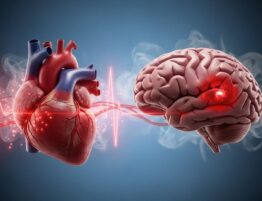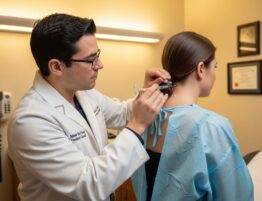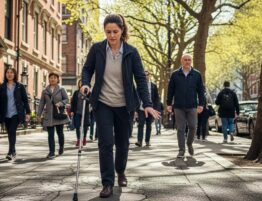Cancer treatment saves lives, but it can come at a steep cost. Chemotherapy-induced peripheral neuropathy (CIPN) affects nearly 70% of patients receiving certain drugs, creating a ripple effect that extends far beyond the infusion chair. Nerve damage manifests as tingling, burning, and numbness — sensations that transform routine tasks into formidable challenges.
Hands that once tied shoelaces now fumble with buttons, while feet that easily navigated uneven sidewalks suddenly betray their owners with stumbles and falls. These aren’t minor inconveniences — they’re quality-of-life issues that can persist long after cancer retreats.
Yet outcomes vary dramatically. Some patients recover completely within months, while others face years of persistent CIPN symptoms. The difference often lies in early recognition and proactive management, with a patient-neurological specialist partnership making a significant impact.
Knowledge empowers patients to advocate for themselves during treatment. Understanding which chemotherapy drugs pose the highest risks helps you prepare, while knowing what CIPN symptoms to watch for ensures prompt reporting. Your medical team can only adjust treatment plans when they know problems exist, so the sooner you speak up, the better your chances of minimizing long-term damage.
Understanding Chemotherapy-Induced Peripheral Neuropathy (CIPN)
Your peripheral nervous system operates like an extensive electrical grid, transmitting signals from the brain throughout the body and back again. Chemotherapy-induced peripheral neuropathy (CIPN) disrupts this network because the same drugs that destroy cancer cells also attack healthy nerve tissue, with the longest nerves extending to the hands and feet suffering the most damage.
Certain chemotherapy agents pose higher risks than others:
- Platinum-based compounds (cisplatin, oxaliplatin, carboplatin)
- Taxanes (paclitaxel, docetaxel)
- Vinca alkaloids (vincristine, vinblastine)
- Proteasome inhibitors (bortezomib)
- Immunomodulatory drugs (thalidomide, lenalidomide)
The damage accumulates with each treatment cycle, with higher cumulative doses causing greater nerve injury. This dose-dependent relationship explains why oncologists carefully track total exposure and monitor throughout your treatment course to help prevent nerve damage during chemotherapy.
Temporary neuropathy resolves within weeks or months after chemotherapy ends, while long-term cases persist for years or become permanent. Developing nerve symptoms doesn’t indicate treatment failure — these are separate processes that occur independently. Your cancer therapy can work brilliantly while still causing nerve complications.
The timing of symptom onset varies between drug classes. Platinum compounds often cause CIPN symptoms during active treatment, while taxane-related neuropathy sometimes emerges weeks after treatment concludes. This delayed onset catches many patients off guard who assume the worst is behind them, only to face new challenges during their recovery period.
Individual risk factors influence who develops CIPN and how severe it becomes. Pre-existing diabetes doubles the risk, prior chemotherapy exposure compounds the damage, and age plays a significant role — older patients experience higher rates of neuropathy. Genetic variations also affect how efficiently your body metabolizes these toxic drugs.
Common CIPN Symptoms and How They Progress
CIPN symptoms emerge gradually, starting in the fingertips and toes before spreading upward in a pattern resembling the wearing of gloves and stockings. The progression follows a predictable sequence, though severity varies significantly between individuals.
Early warning signs include:
- Tingling or pins-and-needles sensations
- Decreased ability to feel textures or temperatures
- Heightened sensitivity to touch (allodynia)
- Sharp, shooting pains
Numbness typically develops next, erasing normal sensation as patients describe feeling disconnected from their extremities — as if they’re wearing thick gloves or walking on cotton. This sensory loss creates significant safety hazards since burns may go unnoticed, cuts remain undetected, and balance becomes precarious.
Motor CIPN symptoms arrive later, with muscle weakness affecting fine motor control first. Patients drop objects, struggle with zippers, and notice their handwriting deteriorating. Foot drop may develop, leading to a shuffling gait, while some experience cramping or muscle twitching.
Seek immediate medical attention for severe pain uncontrolled by medication, sudden weakness, or balance problems that require neurological assessment. These red flags may demand treatment adjustments to prevent further damage.
How Chemotherapy Damages Nerves
The biological mechanisms behind nerve damage involve multiple complex pathways. Taxanes disrupt microtubules — tiny structures that transport nutrients along nerve fibers — and without this supply line, nerve cells starve and malfunction.
Platinum compounds accumulate in dorsal root ganglia near the spinal cord, triggering oxidative stress and inflammation. Free radicals overwhelm the nerve’s natural antioxidant defenses, causing widespread cellular damage as myelin sheaths deteriorate and slow signal transmission.
Sensory nerves suffer disproportionately because they lack the robust protective barriers present elsewhere in the nervous system, leaving them vulnerable to circulating toxins. This vulnerability explains why altered sensation and pain dominate the clinical picture of CIPN.
Understanding these damage mechanisms helps researchers develop targeted interventions. Scientists are investigating neuroprotective agents that shield nerves during treatment — some compounds block oxidative stress pathways, while others support mitochondrial function in nerve cells. These emerging therapies may revolutionize how we prevent nerve damage during chemotherapy in future cancer patients.
Effective CIPN Treatment Options for Symptom Relief
No universal remedy exists for chemotherapy nerve pain relief, so treatment must be individualized based on symptom type, severity, and patient tolerance. Neurologists employ a layered approach, combining multiple interventions for optimal results.
Duloxetine remains the only FDA-approved medication specifically for CIPN treatment. This antidepressant modulates pain pathways in the central nervous system to reduce discomfort intensity, and clinical trials demonstrate modest but meaningful benefits for many patients.
Gabapentin and pregabalin calm overactive nerve firing patterns. Originally developed for epilepsy, these drugs help approximately 40% of neuropathy patients achieve significant relief. Topical agents offer localized symptom control without systemic side effects — capsaicin cream depletes pain-transmitting chemicals, while lidocaine patches provide numbing relief directly at the site of discomfort.
Physical therapy rebuilds what nerve damage has compromised. Balance training reestablishes proprioception (the body’s spatial awareness), strengthening exercises compensate for weakened muscles, and range-of-motion work maintains flexibility. A skilled therapist becomes an invaluable ally in your recovery journey.
Complementary approaches worth considering for CIPN treatment:
- Acupuncture for pain modulation
- Massage to improve circulation
- Transcutaneous electrical nerve stimulation (TENS)
- Mindfulness-based stress reduction
Practical modifications make daily life more manageable. Weighted utensils stabilize trembling hands, non-slip mats prevent bathroom falls, adaptive clothing eliminates frustrating fasteners, and voice-activated technology reduces reliance on compromised fine motor skills.
Some patients benefit significantly from combination therapy approaches. Pairing medication with physical therapy produces better outcomes than either treatment alone, while adding acupuncture to standard medical treatment can enhance chemotherapy nerve pain relief. The goal is to find the right combination for your specific symptom pattern.
Medication adjustments require patience and persistence. The first drug tried may not provide adequate relief, doses need fine-tuning over weeks or months, and side effects sometimes necessitate switching to different options. Working closely with your neurologist ensures you receive optimal symptom control over time.
How to Prevent Nerve Damage During Chemotherapy
Prevention begins before the first infusion with baseline neurological testing to establish a reference point. Simple assessments like vibration sense, reflex testing, and gait evaluation allow early detection of emerging problems.
Symptom tracking throughout treatment catches issues before they escalate. Document new sensations carefully: when they occur, what triggers them, and how much they interfere with daily activities. This detailed information guides dose adjustments and helps implement protective interventions to prevent nerve damage during chemotherapy.
Nutritional strategies that may offer protection:
- Maintain adequate vitamin B12 levels
- Consider antioxidant supplementation (discuss with your oncologist first)
- Ensure sufficient vitamin D status
- Support glutathione production through diet
Avoid compounding risk factors whenever possible. Alcohol acts as a neurotoxin that multiplies chemotherapy’s damage, while uncontrolled diabetes accelerates nerve injury through separate mechanisms. Eliminate what you can control while enduring what you cannot change.
Cooling therapy shows real promise for prevention. Wearing frozen gloves and socks during infusion constricts blood vessels in the extremities, reducing the concentration of chemotherapy at nerve endings. Multiple studies confirm this intervention decreases CIPN symptoms without compromising cancer treatment effectiveness.
Communication with your medical team determines outcomes. Report new symptoms immediately rather than waiting for your next scheduled appointment. Early intervention allows dose modifications, drug switches, or strategic treatment delays that can prevent permanent nerve injury while maintaining cancer control. The oncology team can only help with problems they know about.
Some oncologists use a “dose-dense” approach, with shorter treatment intervals, which may reduce cumulative nerve exposure. Others employ drug holidays — planned breaks that allow partial nerve recovery between cycles. These timing adjustments require careful balancing of cancer control against neuropathy risk.
Living with CIPN: Coping Tips and Long-Term Outlook
Chronic nerve pain reshapes daily existence in countless small ways, with each adaptation serving as both a solution and a reminder of what chemotherapy took. The psychological toll compounds physical limitations as anxiety, depression, and frustration become unwelcome companions alongside CIPN symptoms.
Adaptive equipment restores independence rather than signaling defeat. Button hooks, zipper pulls, and magnetic closures eliminate dressing struggles; ergonomic kitchen tools accommodate weak grips; shower chairs provide stability; and voice-controlled devices reduce reliance on fumbling fingers. These are strategic adaptations that maintain quality of life.
Recovery timelines vary enormously with CIPN treatment. Some patients notice gradual improvement beginning three to six months post-treatment, though nerves regenerate slowly — approximately 1 millimeter per day — making patience mandatory. Complete resolution may take two years or more for some individuals.
At Lone Star Neurology, our specialists bring extensive experience managing the complex challenges of chemotherapy-induced peripheral neuropathy (CIPN). Through comprehensive evaluations, we identify specific patterns of damage and develop personalized treatment plans that address individual symptom profiles. This expert guidance makes a tangible difference in both comfort and function.
Don’t accept nerve damage as an inevitable consequence of cancer survival. Better solutions for CIPN treatment exist. Contact Lone Star Neurology to develop a comprehensive treatment approach that addresses your specific needs and helps restore the quality of life you deserve.












Please, leave your review
Write a comment: